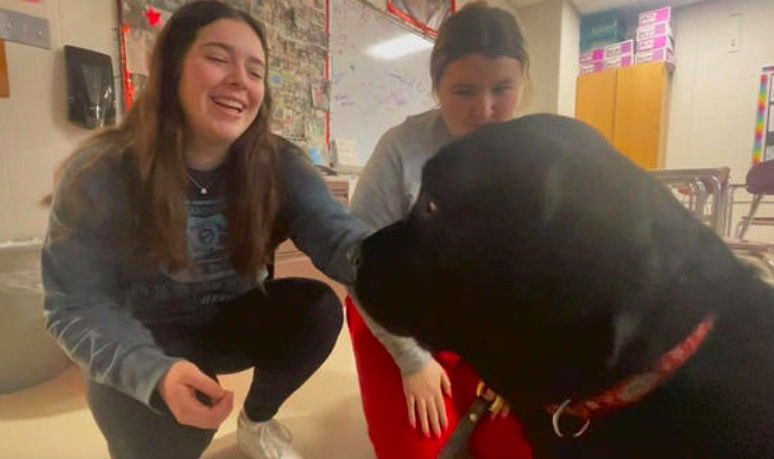“We cannot struggle alone”: Students learning mental health ‘first aid’ to identify friends in need

Cooper is a one-year-old black lab with a big face and sweet
By Paula Ebben
Click here for updates on this story
READING, Massachusetts (WBZ) — Cooper is a one-year-old black lab with a big face and sweet, droopy eyes. He spends his days at Reading Memorial High School as a comfort dog for kids struggling with anxiety, depression, and a host of other mental health issues.
Cooper is one of several resources available for students who need mental health support, but recently, the school decided another important resource is the kids themselves. “Students are identifying more mental health crises and their peers are seeing it first,” explained health and wellness teacher Michelle Hopkinson.
Cooper is a comfort dog at Reading Memorial High School.
To give those kids the tools they need to help their peers, the school has teamed up with the local police department to teach kids Mental Health First Aid. It is a program that started in Australia and is now being taught all over the world.
Erica McNamara, who works with Reading Police, brought the program to town. “We’ve taught over 450 students how to recognize signs and symptoms and help a friend and access trusted resources,” she said.
The course is taught over seven weeks and kids learn the subtle signs of a friend who might be in trouble, like failing to pass in assignments or refusing to socialize on weekends. The idea is to catch kids before a struggle becomes a crisis.
“I think a lot of kids today say, ‘oh, I’m ok, I’m fine’,” said senior Jagger Ruggiro, who said he has learned a lot about how to help and when it is important to alert an adult.
McNamara and her colleague Krystal Mellonakos-Garay teach the class, and one of the first things they tell kids is that the course will not make them a professional therapist. “But hopefully by the end of it, we become more comfortable talking about mental health – whether it’s good or bad,” Mellonakos-Garay told a room full of students.
According to McNamara, getting kids talking about mental health can break down a common barrier. “Mental health can have a stigma attached to it. It can feel awkward to address tough situations, so we spend time on how to have a difficult conversation,” she said.
There is plenty of need out there. The National Council for Mental Wellbeing reports that one in five teenagers will report a mental health issue at some point in their lives, and the CDC recently reported more than 1 in 4 girls admitted they seriously considered attempting suicide in 2021. That is up 60% from 2011.
“I think the pressure of academics and parents is just getting to kids,” one student told us. “I think a lot of it has to do with growth of social media and how it’s become part of every aspect of our life,” said another.
The students who completed the course say they now feel better equipped to recognize the signs that a friend could be in real trouble and when to contact and adult.
“It puts friends in harder positions,” said senior Katie Hurley. “But in the end, it’s good for them because we are still kids, and we have to learn that we cannot struggle alone.”
Please note: This content carries a strict local market embargo. If you share the same market as the contributor of this article, you may not use it on any platform.
